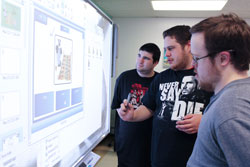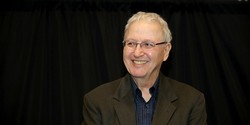When an individual with a developmental disability graduates from high school, they are often faced with the challenge of where to go next. There are many programs that focus on job training, but the Family Resource Associates (FRA) of Monmouth and Ocean Counties offer a different approach.
Nancy Phalanukorn, Executive Director of the FRA, said that the FRA highlights the abilities of its participants; abilities that they can apply to everyday life. “Our goal in making it unique is the realization that people have lots of abilities, and we want to focus on those abilities and we want to keep those abilities strong,” she said.
According to their website, the FRA, “is a New Jersey non-profit agency located in Shrewsbury, helping children, adolescents and people of all ages with disabilities to reach their fullest potential. FRA connects individuals to independence through modern therapies and advanced technology.”
Additionally, Phalanukorn said the FRA gives opportunities for increased independence, increased connection with their community, and focuses on the family as well.
The FRA was founded 36 years ago as a service that focused on infants to eight-year-olds with a developmental disability. About 10 years ago, the FRA saw those children getting older, and not having many programs to go into after graduation. Phalanukorn said, “We were seeing the people whose families worked so hard to get them through school, to have them included, now sitting at home doing nothing, and becoming very depressed and very isolated, and so we started some of the adult classes.”
The adult classes became popular in Monmouth County, and are continuing to grow. Phalanukorn said, “Over the years we kept growing and being responsive to the needs of the families who said, ‘Gee, could you do this kind of program, could you do a dance program, could you do a summer program, could you have these kind of classes?’, and over the years we kept growing with that, and it continues to evolve.”
With the help of local parents, The FRA has recently opened up a new location in Brick Township, NJ for young adults with developmental disabilities. The program is open five days a week, and students can pick and choose what classes they want to take. The classes start at 9 a.m., and usually end at 2 or 3 p.m. depending on the activity occurring that day. There are a variety of classes they can take such as budgeting, swimming, photography, dancing, and computers.
Joanne Castellano, Director of TECHConnection at the FRA, said, “The classes involve many life skills activities, and learning everything from how to live independently in your own apartment to working on the computer doing a budget, and everything in between.”
Phalanukorn said that the adult FRA classes highlight skills that are functional, such as how to make a salad, determining if food is good or bad, how to count change, or how to make a bed. The Brick facility has a room that simulates an apartment where students can practice these sorts of skills.
The FRA also incorporates the use of technology to ensure its participants are proficient with computers, iPads, and even Smartboards. Phalanukorn said, “Technology is the way of the future. Our people can’t be left behind, or they’re even more at a loss of being connected.”
Castellano said the FRA is different from many other programs because of its “open door policy” with parents. “My favorite aspect is that we are very parent driven. Unlike many agencies or schools, ‘this is what we do and the parent has to deal with it and the student has to deal with it, end of story.’”
Ronnie Juchniewicz of Brick was one of the parents who helped bring the FRA to Ocean County. Her son Richard, 24, attends the FRA program five days out of the week. Juchniewicz said she chose to enroll her son into the FRA because of a difference in the program compared to others. “There is a big difference in program. Their classes are more oriented towards teaching them a skill and reaching a goal, and when they reach that goal, then they move on to the next step.”
Brick resident Linda DiRienzo liked how the FRA adjusts to suit the needs of its participants, including those of her daughter Ivy, 23. “It’s not like taking a college class, like Chemistry 101. The class will grow with them or adjust to what their needs are, and that’s a very great thing. That’s where all the flexibility comes in.”
In fact, the FRA helped DiRienzo’s daughter Ivy begin to swim. DiRienzo said, “My brother has an in-ground pool two doors away from me, I have not been able to teach her how to swim. They got her just about swimming now.”
Special educator at the FRA, Dori Daus, creates programming based on the name of the class and what it must contain. She takes into the account all the ability levels of her students and creates activities that help them be the most they can be.
Daus said, “When I started working here, there was a bigger focus on doing traditional class work. They hired me and I said, ‘I don’t want to do that because these guys are in their twenties and they have been doing that their whole lives and what they really need to do is learn how to enjoy themselves and learn about the world.’ And the people who hired me said, ‘Good!’”
Daus took her students out of the classroom and out on a walk to the post office to send the letter they wrote to community service organizations offering their service. They purchased their own stamps to practice handling money and conversational skills. Daus said it is important for the students to be out and participating in the community.
She said, “Since we’re members of the community, people get used to us being around. Some people get kind of edgy when they see people who are different, but the more you see somebody who is different, the more comfortable you are being around them.”
The FRA is always open to help from the community. They invite volunteers to assist the special educators with helping to keep the students on task. Castellano said, “Because our classes are very computer based, a lot of the time the students need more people in there to help them. Not necessarily to teach them how to use a computer, but to help them stay on task, follow instructions, and to help them with reading.”
Internships are also available for college students. Students from Monmouth University and Georgian Court have had an internship with the FRA. Castellano said, “They gain skills and experience working with students with disabilities. We love working with interns. They have an opportunity to do a little bit of everything.”
Students do not have to be looking into the special education field to get an internship, however. Phalanukorn said, “Some people come to us from communications backgrounds, or education background, or physical education background, or technology to learn about the assisted technology program.”
Phalanukorn just asks that interns do not come and go quickly. She said that the FRA makes sure interns, “are always respectful, and treat our students as adults and not baby them or speak to them in any way that is very childish.”
Moreover, the FRA is looking to the community to help them financially as well. Castellano said, “If the community knew we were here, we always need help financially, with grants and donations.”
Most of their funding comes from the Department of Senior Health and Human Services. While many think the funding from the State covers everything, it does not.
Phalanukorn said, “It’s not possible to meet the needs of any population that is underserved in many ways with just state funding so fundraising and family involvement and the involvement of the community enhances the life again of the people we serve.”
Overall, what Phalanukorn wants the community to know most is that, “There is a unique, engaging, respectful program that is giving adults with disabilities some fun times and some learning times to enrich their lives, and that something finally different like that has come to the area.”
PHOTO TAKEN by Kiera Lanni



